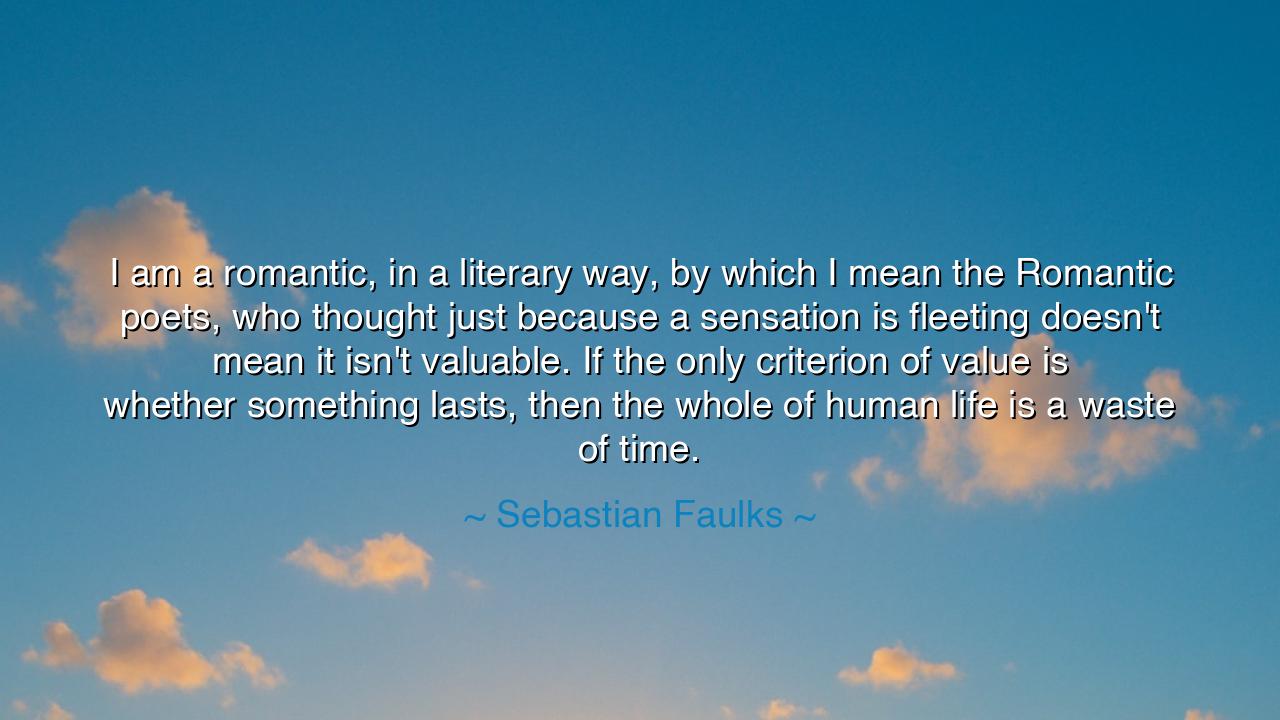
I am a romantic, in a literary way, by which I mean the Romantic
I am a romantic, in a literary way, by which I mean the Romantic poets, who thought just because a sensation is fleeting doesn't mean it isn't valuable. If the only criterion of value is whether something lasts, then the whole of human life is a waste of time.






Listen closely, O children of wisdom, to the words of Sebastian Faulks, who speaks of a deep and timeless truth. He said, “I am a romantic, in a literary way, by which I mean the Romantic poets, who thought just because a sensation is fleeting doesn’t mean it isn’t valuable. If the only criterion of value is whether something lasts, then the whole of human life is a waste of time.” In these words, Faulks connects us to the heart of Romanticism, a movement that emerged from the turmoil of the 18th century and redefined how we view emotion, beauty, and the ephemeral nature of human experience. His thoughts echo the profound wisdom of the Romantic poets, who valued not the permanence of experience, but its depth, its immediacy, and its ability to stir the soul in moments of fleeting intensity.
The Romantic poets, such as Wordsworth, Byron, and Keats, sought to capture the essence of life’s most profound moments—those moments of beauty and emotion that often pass as quickly as they arise. Keats, in his famous ode, “To Autumn,” wrote about the fleeting beauty of the season, of how its richness and transience were interwoven. To the Romantics, it was not the enduring nature of beauty that mattered, but its momentary power. Like the passing autumn leaves, beauty may be short-lived, but it is no less real or meaningful for its transience. It is the ephemeral nature of experience—whether in love, nature, or art—that makes it precious, for it exists in a moment that can never be recaptured.
Consider, O children, the story of Socrates, who, though never writing a word himself, left behind a legacy that has shaped the course of human thought. His life was short, and his influence was fleeting, yet the wisdom he imparted, through brief conversations and fleeting moments of clarity, has lived on for millennia. Socrates taught us that the value of life does not lie in its duration, but in its depth. He spent his days questioning, seeking, and finding truth in the fleeting moments of his interactions with others. His legacy, like that of the Romantic poets, is not defined by permanence but by the intensity and depth of the moments he spent shaping the world through dialogue and thought.
The lesson here, O children, is one of value in impermanence. In our world, we often measure value by how long something lasts. The buildings that stand through the centuries, the famous names that live on for generations—these are often seen as symbols of worth. But the Romantic poets challenge us to look beyond the enduring to find meaning in the fleeting, in the moments that, though short, shape the essence of our lives. Life itself is fleeting, O children, and to wait for something to last forever is to miss the beauty in the present moment. Love, joy, anger, and passion are powerful not because they endure, but because they transform us in the brief moments they occupy.
Think, too, of the story of Leonardo da Vinci, whose paintings and inventions, though monumental, were in many ways unfinished and incomplete. Yet it is precisely these unfinished works—the Mona Lisa, the Vitruvian Man—that have captured the world’s imagination. Da Vinci’s genius lay not in creating perfect, permanent works, but in the brief flashes of insight and beauty that he captured in his life, which continue to speak to us today. He did not wait for perfection; he embraced the fleeting moments of brilliance, trusting that their value would be found not in their completeness, but in their immediacy.
Thus, O children, let us value the moments of our lives, however brief they may be. Just as the Romantic poets saw beauty in the fleeting, so too must we learn to cherish the transient nature of existence. If we wait only for what will last, we will miss the profound joy and wisdom that can only be found in the moment. Love, like the autumn leaves, may not last forever, but it carries with it a truth that endures in the heart. Beauty, like the flash of lightning, may only exist for an instant, but it can shape the soul for eternity.
And so, I say to you, O children of the earth: Live in the moment. Embrace the fleeting, for it is in these transient moments that the heart finds its greatest treasures. Do not measure your life by its longevity, but by its depth and its immediacy. Like the Romantic poets and the great thinkers of the past, find value in what passes quickly, and you will find that the whole of life—though brief—is filled with beauty and meaning.






AAdministratorAdministrator
Welcome, honored guests. Please leave a comment, we will respond soon